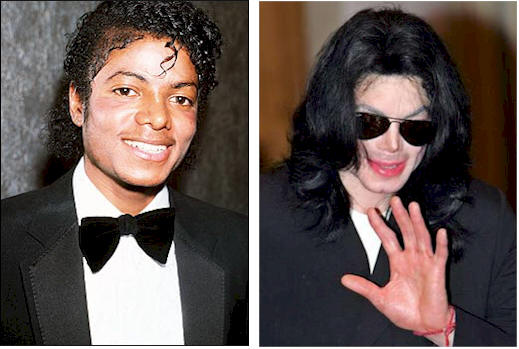June 26, 2009
The freak of consensual sentimentality

- Greil Marcus: Jackson-ism produced the image of a pop explosion, an event in which pop music crosses political, economic, geographic and racial barriers; in which a new world is suggested. Michael Jackson occupied the center of American cultural life: no other black artist had ever come close.
But a pop explosion not only links those otherwise separated by class, place, color and money; it also divides. Confronted with performers as appealing and disturbing as Elvis Presley, the Beatles or the Sex Pistols -- people who raise the possibility of living in a new way -- some respond and some don't. It became clear that Michael Jackson's explosion was of a new kind.
It was the first pop explosion not to be judged by the subjective quality of the response it provoked, but to be measured by the number of objective commercial exchanges it elicited. Michael Jackson was absolutely correct when he announced, at the height of his year [1984], that his greatest achievement was a Guinness Book of World Records award certifying that Thriller had generated more top-ten singles (seven) than any other LP -- and not, as might have been expected ... "to have proven that music is a universal language," or even "to have demonstrated that with God's help your dreams can come true."
The pop explosions of Elvis, the Beatles and the Sex Pistols had assaulted or subverted social values; Thriller crossed over them like kudzu. The Jackson-ist pop explosion ... was brought forth as a version of the official social reality, generated from Washington D.C. as ideology, and from Madison Avenue as language ... a glamorization of the new American fact that if you weren't on top, you didn't exist.
"Winning," read a Nestle ad featuring an Olympic-style medal cast in chocolate, "is everything." "We have one and only one ambition," said Lee Iacocca for Chrysler. "To be the best. What else is there?" Thus the Victory tour -- which originally boasted a more apocalyptic title: "Final Victory."
- Ian Penman:
... a figure as sick as any America has ever produced or procured as an icon. Jackson is more Howard Hughes than Mickey Mouse, more late-Elvis than ET, and more symbolic of everything despoiled and uncertain about childhood in our century, than the harmless Spielbergian dummy he has for so long (been) painted. In a world that can no longer shock us (Madonna, Damage, Basic Instinct: why should adult stuff shock us?) squeaky-clean Michael has come to represent the creepy, shadow's-spawn side of US celebrity.
... Michael's young audience (whose street gestures, styles and music he ceaselessly recycles – sometimes literally rips off) is happy to accept cartoon imitations of human form and aspiration: he doesn't dress well, his dancing is longer exceptional, his sexual projection is embarrassing – you're embarrassed FOR him. In one video last year, you see him being sideline-coached on how to act like a turned-on adult, and any boy (even – or especially – a Gay one) who doesn't know how to react to Naomi Campbell is way off orbit. Michael has no real glamour or allure: words like Dangerous and Bad roll on/off him without any real pleasure-zing of recognition.
What's falling apart isn't just Michael's face but the face of what it represents: his corporate-Pop dream of eternally renewable identity as the ultimate commodity. (In the '80s, it also appealed to all the new teeny bopper post moderns. Lofty-thinking chaps praised Jackson as the ultimate pop paradigm – he was, with Madonna, the ultimate thesis-fix.)
....America used to dominate us like a Lee Marvin sadist: it had no need of running interference from the emotions. Now it's gotten this "Don't you see I have to, because it was done to me" rap, and wants our wounded puppy tears. It wants pity, not awe. It used to be that you kept it zipped: now we have a "feminised" space of confession. It used to be that America's crucified heroes stalked Death Valleys and New Frontiers. Now they work in electronic space, blip time, sealed inside the soundbite, the video and the Vanity Fair cover.